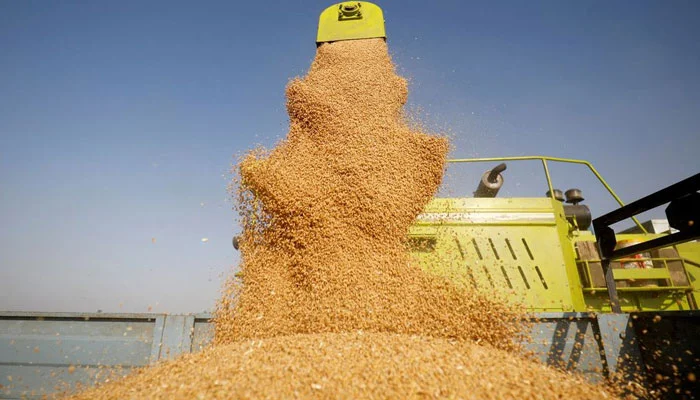- PBF Vice Chairman Ahmad Jawad says looming wheat gap within Pakistan may morph into a full-blown crisis soon.
- Forum urges provincial food depts to monitor wheat purchase by private sector to avoid hoarding.
- Says govt could have to import a minimum of 3 million tonnes of grain to stabilise the market.
ISLAMABAD: A trade body on Monday warned of a looming wheat crisis in the country , urging the government to ban wheat exports to stabilise the wheat prices and cater to supply gaps.
“Looming wheat gap within the country currently seems prepared to morph into a full-blown crisis over the approaching months,” said Pakistan Businesses Forum (PBF) Vice President Ahmad Jawad.
PBF urged provincial food departments to monitor wheat purchase by the private sector and curb involvement of middlemen to avoid hoarding. The explanations embodied domestic output inadequacy and billowy international costs within the wake Ukraine issue. The flour costs were probably to rise additional if the govt remained unable to manage imports and take action against hoarders, it added.
The explanations embodied domestic output inadequacy and billowy international costs in the wake of the Ukraine issue. The flour costs were probably to rise additional if the govt remained unable to manage imports and take action against hoarders, it added.
“Prime Minister Shehbaz Sharif has been educated that this wheat harvest is probably going to hover around 26.2 million tonnes against the target of 28.9 million tonnes.”
The forum said the government may have to import a minimum of 3 million tonnes of grain to stabilise the market and meet the demand of 30.8 million tonnes, despite a carryover stock of 1 million ton.
PBF said that the imports could surpass estimates, pushed by wheat smuggling into Afghanistan, adding that market players had decried wheat imports in the extended quantity.
“One, the cereal is briefly provided globally owing to a poor harvest, secondly, Pakistan doesn’t have enough bucks to get costly imports with the nation’s foreign currency reserves plunging to $10.5 billion on the widening trade and accounting deficits.”
“What will wheat shortages and costly imports mean for the shoppers,” the group questioned. The flour millers have already raised their costs in Punjab by Rs11 per weight unit supported the open market wheat value of Rs2,200 per 40kg when the termination of official releases.
Punjab had been providing wheat to the millers at the subsidised value of Rs1,950 per 40kg, which was additional slashed to Rs1,600 for the first 20 days of Ramadan.
“The flour inadequacy within the market and also the high value of the artifact could increase food insecurity within the country, particularly within the additional backward and poorer districts of the country, unless the govt proactively ensures its convenience at subsidised rates.”
Jawad deplored wheat shortages and increasing imports, and asked for immediate measures to deal with factors such as water shortage, poor farm management practices, global climate change, and carbamide inconvenience, which had bogged down the agriculture sector.

 Entertainment2 days ago
Entertainment2 days ago
 Latest News1 day ago
Latest News1 day ago
 Latest News1 day ago
Latest News1 day ago
 Latest News1 day ago
Latest News1 day ago
 Latest News1 day ago
Latest News1 day ago
 Entertainment2 days ago
Entertainment2 days ago
 Latest News1 day ago
Latest News1 day ago
 Latest News1 day ago
Latest News1 day ago
























